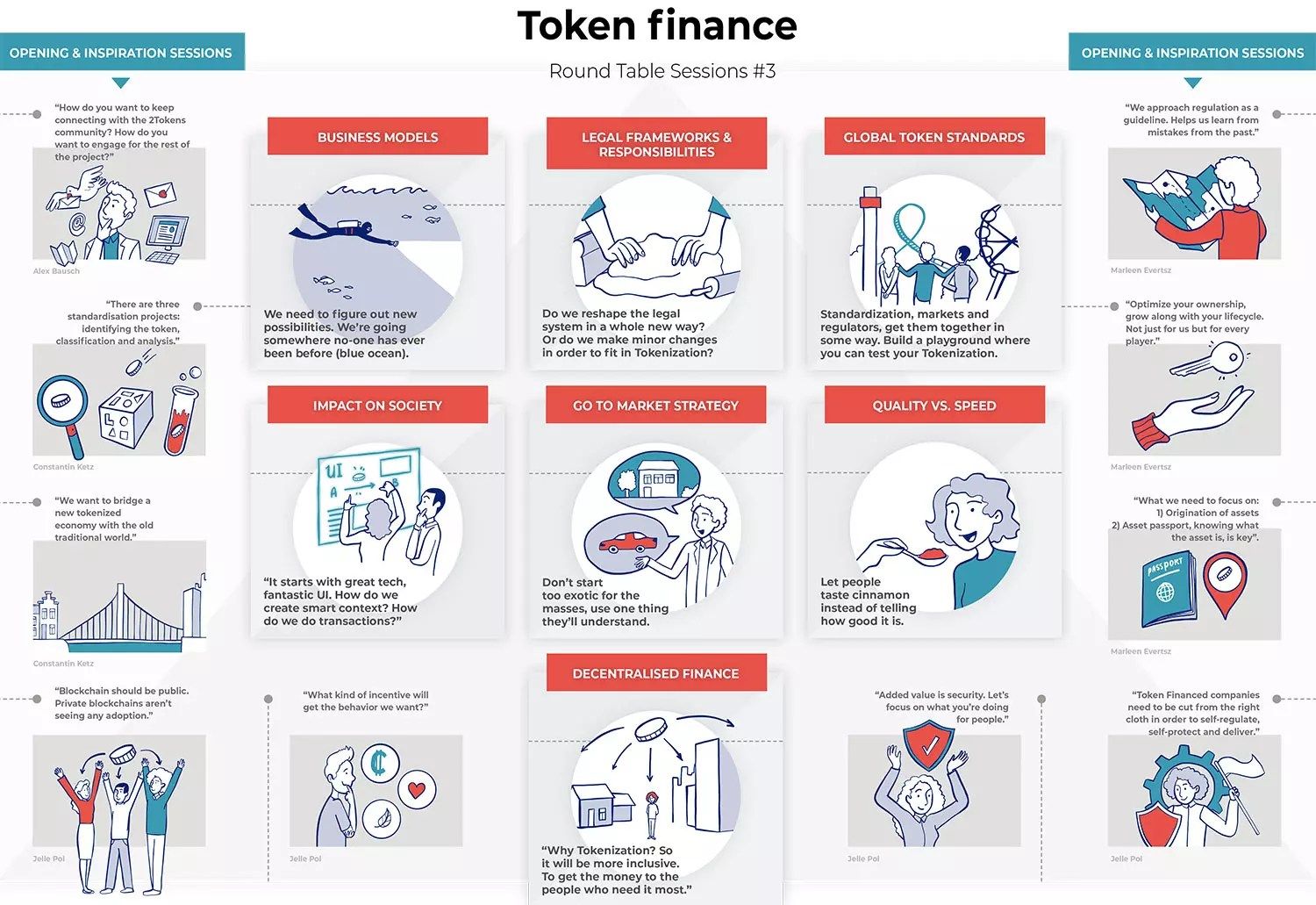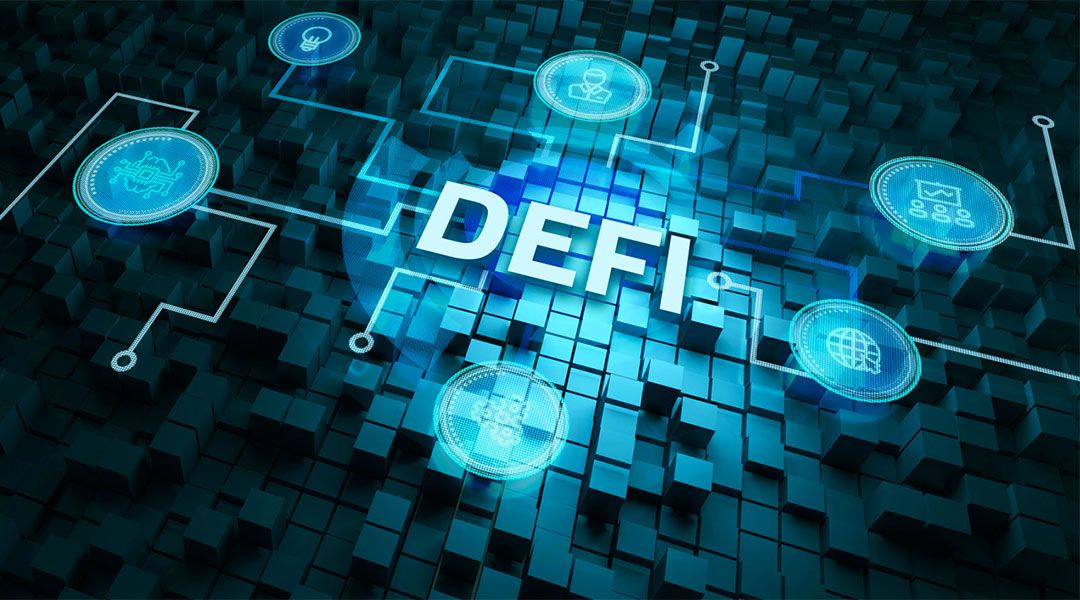Token Financing: How Tokenization Will Change the Economy

Token financing has the opportunity to change the world economy drastically. Security tokens will enable organisations to bring real-world assets online, and decentralised finance (DeFi) aims to replace all existing financial services by decentralised solutions.
One class of security tokens, asset-backed tokens, are connected to a tangible or intangible object that has economic value; it essentially digitalises an asset and records its associated information on a blockchain. Tokenising assets, including real estate, companies, art or digital assets, means lowering costs for issuers, but also improving transparency, efficiency and liquidity of real-world assets. Tokens offer us an opportunity to re-imagine our economy, but how to get there remains a challenge.
Therefore, the 2Tokens project organised a third round table to discuss what token financing is, how it will impact the economy, and what we need to do to make it a success. The first round table, on November 6, 2019, discussed why we need tokenisation, what is required to achieve value from tokenisation, and how we should move ahead with it. During the second round table, on January 14, 2020, we tried to understand the challenges faced when designing new, token-driven, ecosystems. During this third and final round table on February 11, 2020, we took a deep dive into all aspects of token financing.
The event took place in Amsterdam and was hosted by CMS. With over 80 attendees, including representatives from investments firms in the UK and NL, as well as the Dutch regulator AFM, the Dutch central bank DNB and Dutch Government officials, it was a great success. Seven topics related to token financing were discussed:
- Business models: what economic value does token issuance bring for companies? Is there a need for another funding source or are existing options sufficient?
- Legal frameworks & responsibilities: due to its decentralised nature, tokens come with problems such as market manipulation and insider trading. What standards should startups/companies adhere to when raising funds using tokens and how can consumers, investors, as well as the company itself, be protected against malicious behaviour?
- Global token standards: how can we get a token reference framework and market standardisation, so industry players know what rules to play by. How do we ensure regulation on a supranational level, preventing startups from dealing with competing and contradicting rules?
- Impact on society: what are the killer applications for tokenisation, and how can we help startups and incumbents understand the implications and opportunities widely understood?
- Go-to-market strategy: existing regulations tend to stifle innovation for tokenised startups. Existing fee models tend to diminish the benefits of the blockchain ideology in favour of current models by existing organisations. How can startups stand a chance while sticking to the (existing) rules?
- Quality versus speed: new regulation is vital to enable blockchain innovation. Some jurisdictions are creating an arguably lower-quality regulatory framework, while others, i.e. The Netherlands take the stance of quality over speed. How to combine quality and speed to remain competitive as a jurisdiction?
- Decentralised finance: what is decentralised finance (DeFi), what are useful applications, and how can the community raise awareness for the disruptive market forces of decentralised finance?
Token financing offers companies a variety of benefits, including the democratisation of value creation. Where companies in the past might have struggled to raise the funds for their venture, token financing offers lower entry barriers for (micro) investors, a wider market to raise funds and easier traceability of and communication with investors. Specialised tokenisation platforms, including Polymath, Stobox, Tokeny or Securitise, offer easy-to-use tools to develop the required smart contracts, deploy a security token, verify investors and raise funds.
Token financing simplifies raising funds across borders, opening up new markets, and with that, potentially new customers. It allows for more complex actors to be involved in a value chain. Fractionalisation of assets will enable redistribution of wealth as anyone with a smartphone, internet connection and some funds in a currency can participate in a raise. Although (new) investors participating in fundraising can originate from anywhere in the world, it becomes easier to comply with various regulations as value flow can be easily tracked. The impact of tokenisation on society will be enormous.
The Impact on Society
Tokenisation will fundamentally change society. Decentralised finance will enable financial inclusion for all people around the world. With approximately 2 billion unbanked, that is a huge opportunity. Fractional ownership will allow small private investors to join large real estate projects on the other side of the world, providing more and easy ownership of assets while increasing transparency and traceability using uniquely identified assets (Know Your Assets (KYA)).
Tokenisation will offer new economic models, lower the cost of trading, will enable faster transactions, make assets liquid (as long as there are sufficient, regulated secondary exchanges), allow regulation to be embedded in it and offer one global market instantly. It could even result in multiple monetary systems (replacing or supplementing the US Dollar as the world currency). The opportunities are enormous.
Unfortunately, there are also fears around tokenisation, which are predominantly caused by the ICO hype in 2017, resulting in many scams. This negative sentiment around cryptocurrencies has created an irrational fear amongst investors and regulators. It is up to the token community to change this and examples such as the Plastic Bank can help do so.
The Plastic Bank
An example of how tokenisation can offer new business models is the Plastic Bank from Vancouver, Canada. It is an initiative where blockchain is used for social good. The Plastic Bank creates a social and environmental impact in areas with high levels of poverty and plastic pollution by turning plastic waste into currency. By enabling the exchange of plastic for blockchain-secured digital tokens, they reveal the value in plastic. This empowers recycling ecosystems around the world. It stops the flow of plastic into oceans by creating a market that connects those who can use plastic waste for recycling and those who have time to collect it.
The Democratisation of Finance
The most significant impact of tokenisation on the world economy will come from decentralised finance. DeFi offers liquidity of assets, efficiency of transactions, inclusive accessibility and low entry barriers by giving anyone with a smartphone and internet connection access to banking services and by cutting out the middlemen, it will significantly lower costs. The new applications, asset classes and financial products that DeFi will enable will shift the ecosystem from the investor to the investee.
We start to see the first truly revolutionary DeFi applications, one of them being MakerDAO, which is a decentralised lending platform. It offers peer-to-peer financial contracts on Ethereum, and the stablecoin Dai will be an enabler for future DeFi applications. In the coming five years, we will see more revolutionary DeFi applications, drastically changing the financial services ecosystem.
We will see decentralised protocols around exchange trading and derivatives, insurance, money transfer and remittances and currencies in general. We will see automatic derivative contracts (OTC contracts), which will be trading bots similar to those used in big trading houses, but then available for the retail market. The tokenisation of assets, including financing and usage of self-driving cars, will take off. To understand the impact of this, look no further than Decentraland, which focuses on tokenising digital assets in games.
To enable decentralised finance, we first need a widely available decentralised infrastructure. This includes protocols with a seamless UI/UX, interoperability among blockchains, decentralised exchanges and self-sovereign identity. A decentralised infrastructure is not enough; we also require a regulatory framework that brings safety and trust in the system.
Legal Framework and Responsibilities
Any industry confronted with disruptive technology faces the challenge of establishing a legal framework that sets the rules of the game to protect investors, consumers and companies and get rid of bad actors. The same applies to the blockchain ecosystem.
With the rise of the ICOs in 2017, there have been plenty of examples of bad actors trying to game the system. A legal framework gives trust and, if developed correctly, can integrate the ‘old’ and the ‘new’ world, resulting in increased adoption and innovation by industry players. A clear legal framework will also offer financial stability for those companies that do take the leap. As long as they can be aware of what is expected from them, they know what to do.
Key in determining regulations is a clear expectancy from regulators towards the future and any support for future investments. A robust regulatory framework will reduce regulatory risks, prevent abuse (such as money laundering) and enable companies developing tokenisation initiatives while anticipating the future.
When discussing token standards and regulatory frameworks, it is crucial to be aware that the token and blockchain space is still young and will change over time. When developing regulations, allow new initiatives to play around in regulation-free sandboxes. This gives startups a chance to develop new products and services by giving them some flexibility when it comes to rules and regulations. Similar to the three-year safe harbour period as suggested by US Securities and Exchange Commission (SEC) commissioner Hester Peirce a.k.a. ‘Crypto Mom’. Regulators should enable a new ecosystem to experiment and develop while monitoring progress. The lessons learned from such an initiative can help develop regulation that offers a clear mandate for startups in the long run, while immediately enabling innovation.
To strengthen the development of useful regulation, stakeholders could work together around one or two tokenised startups to learn from the entire process and consider the lessons learned. Decision-makers should be guided and taken by the hand to show the importance of a token-friendly regulatory framework. This might be a slow(er) process. Still, it prevents going with the hype or trying to adapt existing or already planned regulation on a new situation (such as the AMLD5 regulation as applied in The Netherlands, where the Dutch Financial Ministry places exchanges and (professional) wallet service providers under a number of specific obligations, resulting in high costs for such companies). It could also enable all stakeholders, such as banks that are currently refusing to give token startups a bank account, understand the opportunities that tokenisation brings.
A changing regulatory framework is necessary, but unfortunately, in multiple jurisdictions across Europe, developments of such a framework is a slow process. This can be due to incumbents slowing the process as they see what is at stake (e.g. no bank accounts for crypto startups) or because regulators are not seeing the urgency (e.g. because the economy is doing so well). Nevertheless, a legal token framework is especially necessary due to its decentralised nature. Apart from all the benefits of decentralisation, unfortunately, it also brings challenges such as market manipulation and insider trading. What standards should startups/companies adhere to when raising funds using tokens and how can consumers, investors, as well as the company itself, be protected against malicious behaviour?
The Importance of a Token Standard
What is necessary to enable innovative token financing? Above all, well-informed regulators, standardisation of terminology and processes as well as unification across jurisdictions to prevent a patchwork of regulations. One of these initiatives, the International Token Standardization Association (ITSA), gave a talk on the importance of token standardisation. ITSA is a not-for-profit association of German law with currently more than 200 international members from various industries. To enable token standardisation, they are working on three distinct projects:
- International Token Identification Number (ITIN): The objective is to assign a 9-digit alphanumeric identifier to all types of cryptographic tokens for unambiguous identification, decreased operational risk and increased transparency. It will help to uniquely identify security tokens that transfer between stakeholders;
- International Token Classification (ITC): Creating a flexible and extendable framework for the classification of all kinds of cryptographic tokens according to various different dimensions (economic, technological, legal, etc.);
- International Token Database (TOKENBASE): Providing reliable qualitative and quantitative data on +600 cryptographic tokens for business and academia in varying granularity and with optional extensions by adjunct data providers.
With these three projects, the ITSA aims to set the standards for global token markets. The more tokens become commonplace in business and society, the more crucial such standards will become. Especially in an industry developing as rapidly as the blockchain space, a clear, stable and consistent legal framework together with a shared understanding of the set of roles, terminology and responsibilities can be a catalyst for further innovation.
Token standardisation and token issuance regulations can also assist in preventing common flaws, hacks and scams. Of course, smart contracts are still code and code contains bugs, but a standardised approach can reduce the risks. Focus on the usability of human needs first and how tokens can improve society. Tokens and blockchain can enable the empowerment of citizens and consumers, and this should be encouraged in the regulations created.
Tokenisation standards should involve all stakeholders, but first and foremost the token experts, including cyberpunks, cryptographists and business leaders developing tokenised ecosystems. When developing a regulatory framework, we should learn from other jurisdictions and do not try to go at it alone. Especially within the EU, regulations should be aligned and not competing.
Token Education
Apart from standards, people need to be educated. Incumbents need to be challenged, and regulators need to be awoken to see the urgency. A common taxonomy, offering a common language, certainly helps in achieving that. Too many stakeholders, including regulators, customers and potential investors, lack a thorough understanding of tokenisation and its potential. There is still a negative image surrounding tokenisation. As recently as last week, a Columbia Law professor labelled bitcoin as a ‘crime tool’, in an academic paper. Such publications make it clear that the industry needs to step up its promotional activities and promote a more positive image of tokenisation.
The community should engage with existing businesses, academics and regulators to help them understand the added value and potential of tokenisation. This could potentially be achieved by creating a trusted, multi-disciplined research centre documenting token applications, best practices and uses cases across the globe and where key decision-makers, but also interested consumers, can turn to and learn more about tokenisation.
Conclusion
Tokens are changing the economy. Although it is still early days, we already can see the impact it will have on our society. Decentralised finance will open up the financial system to anyone around the world, the tokenisation of assets will bring liquidity to markets, as long as the infrastructure to exchange those assets is there. For decentralisation to have any chance of success, we need interoperability between various blockchain networks and decentralised applications should offer a seamless experience, where the UI/UX is separated from the token layer. At least, if we wish to convince consumers to use them.
More importantly, the community and regulators need to work together to develop clear standards and regulatory frameworks. A robust regulatory framework will reduce regulatory risks, it will enable innovation by providing startups with clarity around the rules of tokenised ecosystems, and it will allow incumbents to open up for those startups. Standardised taxonomy and terminology and education of stakeholders is vital in achieving this.
Tokenisation is taking the world by storm, and our objective of these three 2Tokens round tables was to better understand how and what regulators and policymakers need to do to adapt to the new reality. In the past months, we have received a lot of input and the feedback we got was to scale up the 2Tokens initiative, invite more players and take it international. The next steps of the 2Tokens project will include workshops and masterclasses to further educate the stakeholders and together work on the right regulatory framework for tokenisation.





